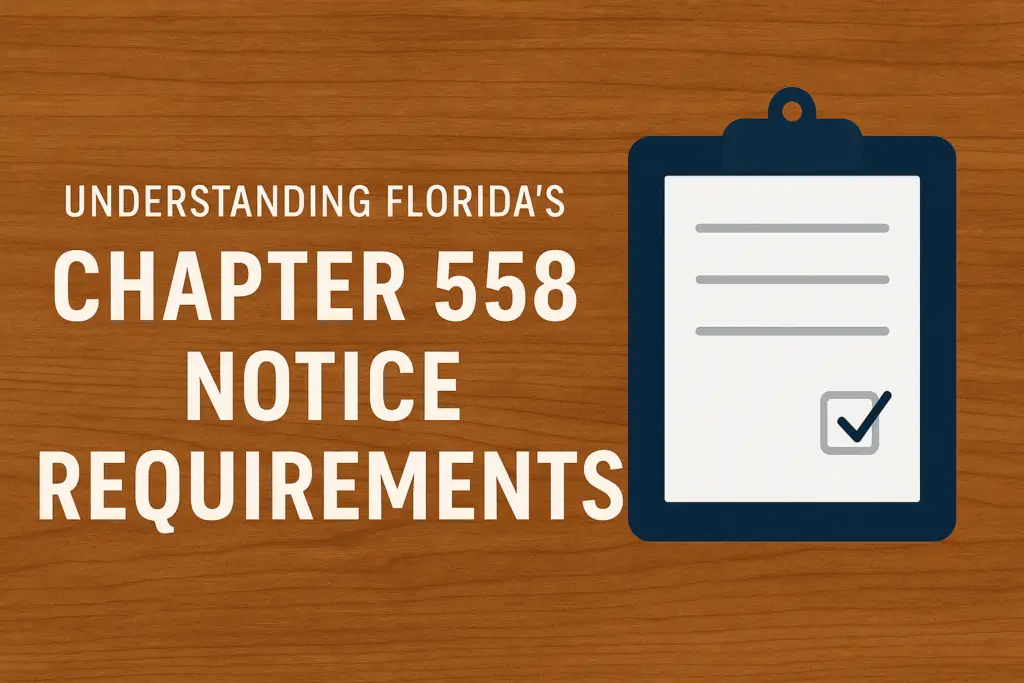When You Must Comply—and When You Don’t
If you’re involved in a construction defect dispute in Florida—whether you’re a property owner, contractor, subcontractor, or design professional—Florida Statutes Chapter 558 may apply. This law requires certain parties to send a pre-suit notice of construction defects and give the contractor or responsible party an opportunity to inspect and repair before filing a lawsuit.
But Chapter 558 doesn’t apply in every case—and using the wrong process can delay your claim or hurt your defense. Here’s what contractors, developers, and property owners need to know about when Florida’s 558 process applies, when it doesn’t, and how to comply correctly.
🏗️ What Is Chapter 558?
Chapter 558, Florida Statutes, sets out a mandatory pre-suit procedure for certain construction defect claims. It’s designed to encourage early resolution by requiring:
- A written notice of the alleged defect(s)
- An opportunity for inspection
- A formal response from the contractor (or other responsible party)
- A chance to settle, repair, or dispute the claim before litigation
This is often referred to as Florida’s “right to cure” law for construction defects.
✅ When Does Chapter 558 Apply?
You must comply with Chapter 558 if:
- You are a property owner or contractor making a claim for damages caused by a construction defect
- The claim involves work performed by a licensed contractor, subcontractor, supplier, or design professional
- You are alleging physical damage, code violations, or defective workmanship or materials
This process applies to both residential and commercial properties.
❌ When Chapter 558 Does Not Apply
There are important exceptions where Chapter 558 does not apply:
- Claims against unlicensed contractors
- Claims involving failure to pull required permits
- Claims that are purely contractual or financial (e.g., breach of contract or non-payment)
- Disputes that don’t involve a construction defect (e.g., delays, scheduling issues)
If your claim is based on the contractor being unlicensed at the time of contracting or performing work without required permits, you are not required to follow the Chapter 558 process before filing suit.
Similarly, if you’re making a claim for unpaid work or asserting backcharges unrelated to defective construction, Chapter 558 does not apply.
📝 How to Comply With Chapter 558 (When It Applies)
For Property Owners or Claimants:
- Serve a Written Notice of Claim
- Describe each alleged defect in reasonable detail
- Include known damage caused by the defect
- Send the notice at least 60 days before filing a lawsuit
- For large-scale commercial projects, a 120-day notice may apply
- Allow Inspection
- The contractor or respondent may inspect the property within 30 days of receiving the notice.
- Wait for a Written Response
- The contractor must respond within 45 days with one of the following:
- Offer to repair
- Offer a monetary settlement
- Denial of liability
- Offer a combination of repair and monetary compensation
- The contractor must respond within 45 days with one of the following:
Only after completing this process—or if the contractor fails to respond—can you proceed to file a lawsuit.
For Contractors or Respondents:
If you receive a Chapter 558 notice:
- Act quickly—you typically have 30 days to inspect and 45 days to respond
- Coordinate with your insurance carrier—a 558 notice is often treated as a claim under general liability or builder’s risk insurance
- Respond in writing with your decision to repair, settle, or dispute the claim
- Keep records of inspections, communications, and any proposed resolution
Failing to respond can limit your ability to resolve the dispute without litigation.
🧠 Why Complying With Chapter 558 Matters
If Chapter 558 applies and you skip the process, your lawsuit could be stayed (paused) or even dismissed until you comply. On the other hand, failing to comply when 558 doesn’t apply can waste time and create unnecessary delay.
Understanding whether your case falls within Chapter 558—and handling it properly—is essential to protecting your rights and resolving the dispute efficiently.
👨⚖️ How Douglas Law Firm Can Help
We represent:
- Property owners seeking to pursue defect claims
- Contractors and subcontractors responding to 558 notices
- Insurance carriers seeking guidance on coverage and defense obligations
We’ll help you determine if Chapter 558 applies, handle all notice and response requirements, and position your case for early resolution—or litigation if necessary.
📞 Dealing With a Construction Defect or Dispute?
Don’t make assumptions about Florida’s pre-suit requirements. Whether you’re preparing a claim or defending one, we’ll make sure you’re in compliance—and protected.
📌 Contact Douglas Law Firm today to speak with a Florida construction attorney who understands Chapter 558 and how to use it strategically.
